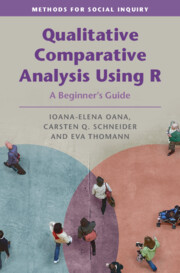4 - Sufficient Conditions
Published online by Cambridge University Press: 07 October 2021
Summary
Let X be the condition ‘soccer player living close to the training site’ and Y the outcome ‘arriving in time for training’. If empirically all players who live close to the training ground also arrive in time for practice, then X implies Y, or X is a subset of Y. This empirical pattern provides support for interpreting X as sufficient for Y.
In this chapter, we introduce the basic logic of sufficiency and introduce various parameters of fit for sufficient conditions. We explain how to allow for causal complexity in terms of conjunctural causation, equifinality, and asymmetry, how to summarize and present data in the form of a truth table, and how to then analyze that truth table via the process of logical minimization.
Learning goals:
- Understanding of the basic logic of sufficiency.
- Assessing deviations from perfect subset relations of sufficiency using parameters of fit.
- Understanding of how to represent data in a truth table.
- Understanding of how to analyze and logically minimize truth tables for detecting set relations.
- Familiarity with the various ways of dealing with limited diversity.
- Ability to implement all of the above in R for both crisp and fuzzy sets.
Keywords
Information
- Type
- Chapter
- Information
- Qualitative Comparative Analysis Using RA Beginner's Guide, pp. 86 - 140Publisher: Cambridge University PressPrint publication year: 2021
